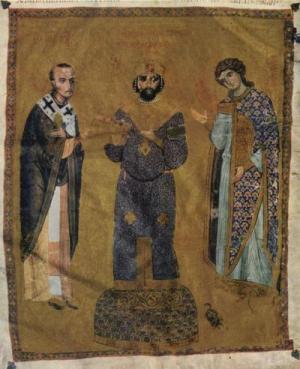|
|
|
Nikephoros III Botaneiates or Nicephorus III Botaniates had served as general under Constantine IX and
Romanos IV Diogenes.
He descended of the eminent aristocratic family of Phocades in
Asia Minor.
Under Michael VII Doukas he became governor of the Anatolic theme and commander of the troops in Asia. He revolted against Michael VII and his finance minister
Nikephoritzes, and with the connivance of the
Seljuk Turks
marched upon Nicaea, where he proclaimed himself emperor.

Nikephoros III was crowned by Patriarch Kosmas I, in
Aghia Sophia,
in 1078 and married Michael VII Doukas' wife, the exotic princess Maria of Alania. Botaneiates was supported by his general Alexios Komnenos,
who managed to stifle the revolt of Bryennios in Thrace as well as the revolt of Nikephoros Basilakes in Thessalonike both of whom claimed the throne. The policy followed by the
emperor, however, was not one the gravity of the situation required. The state became even more destitute.
The state coffers were emptied as invasions across all the borders had to be dealt with and also due to the extravagant lifestyle of Botaneiates. The grave economic crisis led anew to a
devaluation of both golden and silver currency.
An important and dangerous opponent in
Asia Minor
was the general Nikephoros Melissenos. The latter, entering into alliance with the Turks and assigning them the garrisioning of many
Asia Minor's cities, revolted against the emperor. Melissenos was nominated emperor in Nicaea in 1080, the same year, however, the Turk Suleiman occupied Nicaea and founded the
sultanate of Rum. Melissenos' revolt failed and the Turks became undisputed masters of a large part of central and western Asia Minor, from Cilicia and Phrygia to the Hellespont.
Revolts, however, also broke out in the European provinces, brought about mainly by members of the Komnenoi and Doukades families who supported Alexios Komnenos who was
married to Irene Doukaina, granddaughter of the caesar John Doukas, and wished him to ascend to the throne. Finally,
Alexios Komnenos himself revolted. After a three-day siege -
and due to betrayal on the part of Constantinople's mercenaries- he entered the capital, forced Botaneiates to abdicate and become a monk, while himself was nominated emperor in
April 1081

